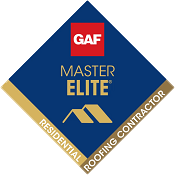Interest in eco-friendly, alternative sources of energy has been growing for decades. Homeowners with concerns about climate change as well as homeowners looking to save money on energy costs have been increasingly asking roofing contractors about alternatives, and manufacturers have responded with new products and technologies.
One of those is solar panels, which have been fairly commonplace in some parts of the country. Solar panels are a great way to save money on your energy bills and help the environment.
However, not all roofs are created equal when it comes to solar panels. Some roof types are better than others for solar panels, and understanding the differences can help you make the best decision for your home.
How Do Solar Panels Work?
Solar panels work by converting sunlight into electricity. They are made up of photovoltaic cells, which create an electric field when exposed to sunlight. This electric field then drives an electric current through wires connected to the solar panel, which can be used to power your home or business.
Solar panels are typically made from silicon, a material that is very good at absorbing sunlight. However, there are also thin-film solar panels made from materials like cadmium telluride or copper indium gallium selenide. These types of solar panels are less efficient than silicon-based panels, but they are cheaper to manufacture.
Although each situation is unique, here is a general overview of how solar panels work:
- During daylight hours, sun activates the photovoltaic cells in the panels.
- This causes electrons in the cell to be set into motion, which creates an electrical current.
- An inverter converts the direct current (DC) electricity into alternating current (AC), which is used in most homes.
- The energy runs through your electric panel and is used to power the home.
- A meter monitors electric usage. During nights or on cloudy days, your home may still need electric from your utility company; on other days your solar panels might generate more energy than you need. Some utilities provide credits for any power that you send back to the power grid.
The output of a solar panel is measured in watts (W). The average solar panel produces around 200 watts of power, but the output can vary depending on the size and type of panel.
History of Solar Panels on Residential Roofs
Solar panels have been used on residential roofs for many years, but their popularity has grown in recent years as the cost of photovoltaic cells has decreased. In addition, government incentives like the Solar Renewable Energy Credit (SREC) have made solar panels more affordable for homeowners.
As of 2016, there were 1.3 million homes in the United States with solar panels installed on their roofs. This number is expected to grow to 7 million by 2030.
The vast majority of solar panel installations are on rooftops, but there are a few homes that have ground-mounted systems. These systems are more expensive and require more maintenance than rooftop systems, but they can be a good option if your roof is not suitable for solar panels.
Solar Panel Cost Savings
The cost for roof installation of solar panels has come down significantly in recent years, making them a more viable option for homeowners. The average cost of a 5kW system is around $15,000 before rebates and incentives, but the final cost will vary depending on the specific system and location.
Solar panels typically have a payback period of 5-10 years, after which they will start to produce positive cash flow. In addition, solar panels increase the value of your home by an average of $15,000.

Solar Panel Pros and Cons
There are a few things to consider before installing solar panels on your roof. Here are some of the pros and cons of solar panels:
Pros of Solar Panels
- Reduce your electric bill – Solar panels can reduce your electric bill by 50-90%.
- Increase the value of your home – Solar panels increase the resale value of your home by an average of $15,000.
- Environmentally friendly – Solar panels are a renewable source of energy and produce no emissions.
Cons of Solar Panels
- Initial cost – Solar panels can be expensive to install, with the average system costing around $15,000. However, there are many rebates and incentives available that can offset the cost.
- Maintenance – Solar panels require very little maintenance, but they should be cleaned occasionally to ensure optimal output.
- Local ordinances – Some localities have restrictions on solar panel installations. It is important to check with your city or county before installing solar panels.
Roof Requirements for Solar Panels
There are a few things to consider before installing solar panels on your roof. Here are some of the requirements for solar panels:
- Your roof must be able to support the weight of the solar panels.
- Your roof must have enough sun exposure to generate the desired amount of electricity.
- You must have a way to connect the solar panels to your electrical system.
Best Color Roof for Solar Panels
The best color roof for solar panels is a light color like white or pale blue. Darker colors absorb more heat, which can decrease the efficiency of the solar panels. In addition, lighter colors reflect more sunlight, which can also help increase the output of the solar panels.
Best Roof Angle for Solar Panels
The angle at which your solar panels are mounted on the roof has an impact on how much power they can generate.The best roof angle for solar panels is south-facing and between 30-45 degrees. This angle allows the solar panels to maximize their exposure to the sun.
Best Roof Shape for Solar Panels
The best roof shape for solar panels is a flat or slightly pitched roof. Solar panels can be installed on most types of roofs, though a pitch of over 40 degrees is often considered too steep to be effective. A flat or slightly pitched roof will allow the solar panels to get the most sun exposure.
How Are Solar Panels Installed?
Solar panels are installed by mounting them on your roof and connecting them to your electrical system. The process for installing solar panels is relatively straightforward for a solar company or a professional roofing company.
Local Ordinances for Solar Panels
Some localities have ordinances that regulate the installation of solar panels. It is important to check with your city or county before installing solar panels.
Most ordinances simply require that the solar panels meet certain standards, such as being properly anchored to the roof and not blocking any windows or doors. However, some ordinances may prohibit solar panel installations altogether.
Installing Solar Panels on Your Roof
Installing solar panels on your roof is a relatively simple process. First, the solar panels are mounted on the roof using brackets or rails. Next, the solar panels are connected to your electrical system. Finally, the solar panels are tested to ensure that they are working properly.
Solar Panel Maintenance
Solar panels require very little maintenance, but they should be cleaned occasionally to ensure optimal output. The best way to clean solar panels is with a soft cloth and warm water. You should also check the connections between the solar panels and your electrical system periodically to make sure that they are tight.

What Roofing Material Can Solar Panels Be Installed On?
Solar panels can be installed on most types of roofs, including asphalt shingles, metal roofs, and tile roofs. However, some roofing materials are better suited for solar panels than others. Asphalt shingles and metal roofs are the most common type of roofs for solar panel installations.
Asphalt Shingles
Shingle roofing is the most common type of roofing material in the United States. Solar panels can be installed on asphalt shingle roofs, but there are a few things to consider before doing so.
Asphalt shingles are not as durable as other roofing materials, so they may need to be replaced more often if you live in an area with high winds or hail storms. Roof replacement will require that the solar panels be removed and reinstalled.
In addition, asphalt shingles can be damaged by the weight of the solar panels.
Metal Roofs
It is becoming increasingly popular for solar panel installations. Metal roofs are very durable and can withstand high winds and hail storms. In addition, metal roofs reflect sunlight, which can help increase the output of the solar panels.
Tile Roofs
This type of roofing is another option for solar panel installations. Tile roofs are very durable and can last for decades with proper maintenance. However, tile roofs can be expensive to install and repair, so they may not be the best option for everyone.
Homeowners who are looking for a new roof with solar panels should consider which roofing material is best not only for their climate, but also which will work most effectively with solar panels.
Solar Panel FAQs
How much sun is required for solar panels?
Solar panels need direct sunlight to work effectively. The amount of sun required will depend on the specific system, but most systems need at least 4 hours of direct sun per day to generate electricity.
What is the best time of day for solar panels?
The best time of day for solar panels is between 10am and 4pm when the sun is at its highest in the sky. This is when the solar panels will generate the most electricity.
What is the average lifespan of solar panels?
Solar panels have an average lifespan of 25-30 years. However, they will continue to produce electricity after this point, just at a lower output.
What are the benefits of solar panels?
Solar panels have many benefits, including reducing your electric bill, increasing the value of your home, and being environmentally friendly. Solar panels can also help you be less dependent on the grid and provide backup power in case of an outage.
Stronghold Roofing & Solar In & Near Lakeland, FL
When you need the best roofing company in Florida for solar panel installation or other solar roof services, contact Stronghold Roofing & Solar. Our team of experienced roofers can help you find the best and most affordable roofing and solar options for your home or commercial building.
We offer a full range of other commercial and residential roofing services as well, including roof installation, repair, inspections, and maintenance.
We are available 24/7, because we know that roofing emergencies can happen at any time. Roof financing is available, and we can work directly with homeowners insurance if needed.
Contact us at 863-563-3254 today for a free estimate.










